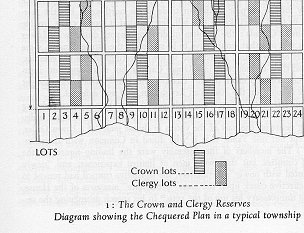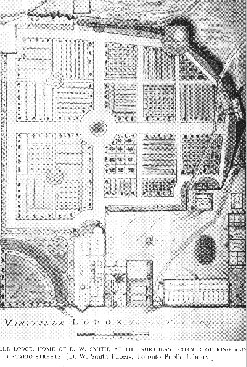
foreword | Historical Narratives | Resources | Links | Contact
DAVID WILLIAM SMITH
[b.1764 - d.1837]
History is a form of autobiography, an essay in self-knowledge.
"Let the peasants have a fiddle and plenty of beverage and beef. They must not want for rum, so remember push about the bottle." These were the words of David William Smith as written to John Askin, a Detroit merchant, captain in the militia and close friend of Smith's. Askin was serving as a kind of campaign manager for Smith during Upper Canada's first-ever elections for the Legislative Assembly which took place in August 1792 for Upper Canada's House of Assembly. Despite the fact that there was no opposing candidate in the riding of Suffolk and Essex, Smith took no chances on what he called the "mercurial mob" and spent over two hundred pounds on election food and drink.In a letter to Askin written from Niagara, Smith authorized Askin to lay on a party as soon as Smith was elected.
In His Own Words
"Give my friends a public dinner and the ladies a dance. Throw open Forsyth's Tavern and call for the best he can supply. Push about the bottle. The more broken heads and bloody noses, the more election-like. Let the favours be plentifully distributed to the old, the young, the lame, the crippled and the blind. Build a bonfire with a cord of wood piled hollow with a tar barrel in the middle. There must be no want. Hoist a large red flag on a pole near the bonfire and with some blue coloured tape, sew on large letters ESSEX."
Smith won that election and was elected again in 1796, this time for the 3rd riding of Lincoln. He was re-elected in 1800 for the riding of Norfolk, Oxford and Middlesex. His ambition, he said, was "to serve the people."
Smith, who had come to Canada directly from England, was unfamiliar with and unimpressed by the democratic notions the Loyalists had brought with them from the 13 Colonies. He was contemptuous of the concept of democracy whose public meetings, he declared, were always "attended by riot and confusion." Smith related elections not to public policy, but to raucous popular festivals. Despite his disdain for "this darned election business," Smith dearly wanted a seat in the Assembly where he would "take great pleasure in framing laws for the lands I have had so much pleasure in laying out."
Smith, the son of a career soldier commissioned an ensign with the 5th Regiment of Foot was stationed at Fort Detroit and Fort Niagara for two years under the command of his father, Lieutenant Colonel John Smith who died at Niagara in 1795. David held a series of regimental administrative posts and later at Fort Niagara. He also acted as clerk of the Hesse District land board from 1791 to 1792 and as an able and ambitious administrator established a sound and systematic basis for settlement. It was reported to Lieutenant Governor John Graves Simcoe that he "took infinite trouble and showed much zeal to put the Settlement on as good a footing as the othe settlements." Simcoe was impressed with Smith's work on the land board and because he considered the 5th the best-administered regiment in the province made him acting deputy-surveyor general of the province. Before long Simcoe grew dependent on the energy and expertise of the bright young man, and during the next ten years Smith was to become one of Simcoe's most trusted, capable and energetic subordinates.
The 5th had a reputation as a sociable regiment and at Niagara, the well-mannered Smith and his beautiful and charming wife were greatly admired. Smith was by nature, however, reserved, cautious, even suspicious. He had little taste for the social routine of garrison life.
In His Own Words
"I have no cronys." Smith's wife died in 1798 at the age 28. Although considered "a social catch," Smith remained aloof from the various cliques that formed in Niagara and York.
Smith articled with the Attorney General and was called to the bar in 1793. His intention was not to practise in the courst but to open the doors to public office. He was promoted to captain in 1795 but in the same year his father died and David's regiment was to Quebec. As soon as his civil appointment was confirmed, he resigned from the army.
First elected to the House of Assesbly in August 1792, he was a member for nearly all his time in Upper Canada, representing Essex from 1792-1796; member for Lincoln, 1796-1800; and member for Norfolk, Oxford and Middlesex, 1800-1804. Smith, a very active member, was elected Speaker for all four sessions of the second Assembly, 1796-1800 and two sessions, 1801-02, of the third. The Governor was particularly pleased with Smith's election to the Legislative Assembly. Simcoe was always apprehensive about the dangers of democracy in the House of Assembly, and wanted Smith's "eyes and ears" in the midst of its members.
All but three of the 16 members were either active Loyalists or British immigrants, and Smith discovered that the first House of Assembly had "violent levelling principles," an expression used at the time to mean strong democratic tendencies. Smith believed that "modesty" should be the characteristic of the first Assembly, since the colony was so "beholden to England." He saw no incompatibility in serving the needs of his constituents, while at the same time upholding the interests of the Empire. He was the only Assemblyman to sit on the Executive Council.
Though a large land owner himself, Smith proposed that a land tax be levied which would be restricted to properties over 200 acres so as not to "burden the settler." The Legislative Council approved the measure, but the Legislative Assembly defeated it. Smith successfully moved a motion to regulate "the practice of physic" (medicine). He also broke a deadlock by voting for a new House rule, that no member should have to serve on a committee for a bill he opposed in principle.
As Speaker he presided over the passing of bills pertaining to clergy reserves, judicial reform, jury service, the establishment of a Superior Court and slavery. He rejected as immoral a bill to make any child of a free man and a slave woman a slave declaring
In His Own Words
"the laws of God and man cannot authorize it."
 |
|
Chequered Plan - Glergy Reserves |
Smith developed the chequered plan of distributing Clergy and Crown reserves in townships rather than concentrating them in various places. Smith suggested leasing Crown reserves, not in order to raise revenues, but to allow the land to be worked and hence make their presence more acceptable to the public. Smith also determined the location of townships to be surveyed and settled. He investigated townships that had been granted to individuals for settlement, and found that few of them had many settlers, because fraud and speculation were rampant. He also recommended that those Loyalists on the 'U. E. List' be exempted from land fees. He produced the first extensive gazetteer of Upper Canada, which contained detailed descriptions of geographic features of the province and social aspects of life in the province, along with extensive maps, tables, charts and short statements on the nature of government.
Smith was appointed a special member of the Executive Council. Smith was one of three trustees appointed to regulate and monitor the sale of lands by the Six Nations Indians. He was also designated Lieutenant of York County. At the same time, he maintained close ties with the militia, holding the rank of colonel with second battalion of the York militia. Peter Hunter, one of Simcoe's successors, so admired Smith's efficiency, that he remarked
In His Own Words
"Six months of your labour is of greater benefit to the province than years of many others."
The land regulations allowed Smith to accumulate more than 20,000 acres in 21 townships, 7800 of which are now part of the Pickering area. He was accused of using his office to select the best locations for himself, Lord Selkirk remarking "The lots marked D.W.S. are sure to be the choice spots." Smith suffered from recurring bouts of fever, his sickness aggravated by his increasing dissatisfion with his position in York whose society he described as plebeian. Smith wanted promotion, not praise, but Lieutenant Governor Hunter, despite his praise for the work of Smith, refused to recommend his permanent appointment to the Legislative Council because the chief justice advised him against it. When Smith learned that the appointment to the legislative council was positively banged, barred and bolted against him, he submitted his resignations from the two pages of appointments he held and left Upper Canada in 1802. Hunter called his departure from the province "an almost irreparable loss."
From the sale of his properties Smith received sufficient money to purchase a handsome home near Alnwick in north eastern England. He became the estate manager of the Duke of Northumberland, one of the largest landowners in England. In 1821 he was made a baronet. Sir David William Smith died at the age of 73 in 1837.
 |
|
Meryville Lodge |
Maryville Lodge - the home, gardens, yard and offices of D. W. Smith, which were located at what is today the northeast corner of King and Qntario Streets, Toronto
Copyright © 2013 Website Administrator